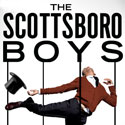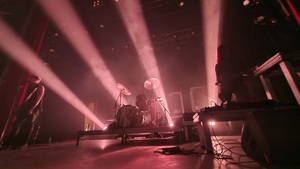
The Scottsboro Boys
by John Kander and Fred Ebb
Vineyard Theatre, New York, NY • now through 4/18/10
Julie Haverkate

Perhaps we sometimes forget that Kander and Ebb, that famous musical duo, were actually Kander and Ebb and Masteroff. Or Kander and Ebb and Fosse. Or as is the case with The Scottsboro Boys, Kander and Ebb and Thompson. In that wonderfully old-school musical theatre tradition, Kander and Ebb were a brilliantly matched composer and lyricist team that rarely wrote without the other, but always brought on a third party to shape the story.
These days, whether the reason is economic, artistic, or simply a control issue – the role of the lyricist is nearly always combined with that of the composer (Stephen Sondheim, Jason Robert Brown, and Adam Guettel all come to mind), or less often, the bookwriter (Brian Yorkey, Michael Korie). The reason for the former’s success rate can probably be explained by a composers’ inherent sense of musical rhythm that naturally extends to words, and as composers already musically tell the story, it makes sense that they would be the best bet to verbally tell it as well through the lyric.
Kander and Ebb seemingly worked as one, and perhaps because of that other most famous of musical pairings, Rodgers (music) and Hammerstein (book/lyrics), we often think of them as working alone, as a steadfast pair. So when Ebb passed away in 2004, maybe we excused the failings of the two “Kander and Ebb” musicals produced since, wistfully believing that had Ebb been around, with his abundant and particular artistry, we would have two very different – and better – shows.
But that’s not necessarily true.
Maybe the lyrics would’ve been crisper – more pointed, a bit less sentimental – had Ebb been able to complete his work on Curtains and The Scottsboro Boys (for each of these musicals, Kander and the respective show’s bookwriter completed the lyrics). But the crux of each of these show’s problems does not lie in the music, nor in the lyric (though neither includes Kander or Ebb’s finest work); the problems lie vastly in the books. While Rupert Holmes’s Curtains is light and airy and entirely insubstantial, David Thompson’s work on The Scottsboro Boys is erratically dark and acute and earnest and sentimental – and regrettably, rather insubstantial as well (not unlike his work on Steel Pier and another huge debacle, Thou Shalt Not).
In its off-Broadway premiere at the Vineyard Theatre, The Scottsboro Boys depicts the true story of American racism in the South: in Alabama, two white women accuse nine African American boys of rape, and the musical follows the boys as they go through trial after trial after trial attempting to prove their innocence. Of the boys’ innocence, there is no doubt – neither in history nor in this musical re-telling of that history. As Thompson portrays them, though, they are so innocent that little else matters – including who they are beyond Wrongfully Accused Black Men.
These two-dimensional innocents would work, though, if the creators had stuck with what is an inspired concept: telling the story of the Scottsboro boys as a minstrel show. The opening and closing numbers are pure minstrelsy, with John Cullum’s white Interlocutor directing the colorfully adorned, eerily happy Mr. Bones and Mr. Tambo (the deliciously spot-on Colman Domingo and Forrest McClendon) in the telling of the tragic story as dark comedy. There are totally inappropriate and blatantly scripted jokes that earn guilty laughs, soft-shoeing with large grins painfully plastered across faces, and of course, Kander’s signature musical jubilance ominously highlighting the wrongness of it all. The minstrelsy pops up sporadically throughout the rest of the show, notably in Susan Stroman’s most cleverly choreographed sequences, such as a disturbing tap-dancing number, “Electric Chair,” in which the boys imagine the terrifying possibilities of their fate.
The remainder of the musical consists of incredibly earnest tragedy in which the boys teach each other to spell (in one particularly poorly-written scene), endlessly lament the unfairness of it all, and of course, ultimately and angrily declare “You Can’t Do Me” like that in the big, showy, and entirely moving 11 o’clock number. The cast is terrifically talented and game, making the best of what they’re given to work with (especially Brandon Victor Dixon’s angry Haywood Patterson), but even they can’t overcome the erraticisms of a show that includes a manipulative, cheap symbolic character (the only female character, largely mute, bookends the show while sitting on a bus – one guess who she represents) that is more than reminiscent of a similar use of character in Rob Ashford’s recent production of Jason Robert Brown’s Tony-Award-winning musical, Parade (Fall 2009 at Los Angeles’s Mark Taper Forum). The similarities between the stories of these two musicals – racism, rape, and wrongful accusations in the South (Parade musicalizes the notorious Leo Frank case) – are too obvious to ignore. Unluckily for Kander and Ebb, the comparisons won’t be in their favor, and few will remember that a man named David Thompson was involved at all. But as for their part in The Scottsboro Boys, the beloved musical duo didn’t fail to provide their signature eye-poppin’ musical sequences cleverly peppered with social commentary. Kander and Ebb, the last of our “Golden Age” musical theatre teams, will most certainly be missed.
Vineyard Theatre: http://www.vineyardtheatre.org ◼












